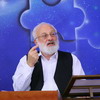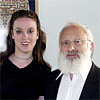Studying Kabbalah Is Beneficial Even While Playing Computer Games
 Questions I received from students who are starting out on the spiritual path:
Questions I received from students who are starting out on the spiritual path:
Question: The way I see things now, I am not sure of anything: I don’t know what the truth is, whether the Rav is real, whether I am on the right path, whether I understand the books correctly, and if I have fallen beneath reason. There are things that I have to accept without knowledge, yet still be critical of them. However, my mind is limited, and hence my criticism is also limited. The way things are going, I might as well be using red strings or thinking that there are “souls” on a plate of food that I eat (“correct”). Is there some basic rule of thumb that I should accept, and then use it to discern the true direction, instead of remaining a puppet that’s controlled all the time?
My Answer: You should only accept the Kabbalists’ advice to study in a group, and wait for the Upper Light to make everything clear to you. I think that by fully participating, you will attain results in four to six months.
Question: I like downloading your lessons and playing them in the background while doing something else, for example, playing computer games. But later I start feeling guilty and thinking that I should either be serious about studying Kabbalah and dedicate all of my time and attention to it, or quit deceiving myself and stop studying altogether, because there’s no use studying the way I do. What do you think?
My Answer: Even this kind of study of Kabbalah is beneficial. However, soon you will decide that it’s time to leave the games behind and start paying more attention to the lessons.
Question (from a German student): I study Kabbalah and I would like to move ahead, but this is very difficult when studying alone. I am not Jewish, I don’t speak Hebrew, and I don’t know who to turn to. I am skeptical about the Kabbalah “experts” who have sprung up everywhere all of a sudden. Maybe I am just being too cautious and not trusting enough? Where can I get certainty about my path? Are there groups or individuals who help people like me find their way?
My Answer: Our German and Austrian groups, our online classes, and our entire archive are ready to help you immediately and at no cost!
Related Material:
Laitman.com Post: This Path Can Only Be Surmounted by Those Who Walk It
Laitman.com Post: Contradictions Bring Understanding
Laitman.com Post: We Are Floating In a Sea of Information Like Croutons In a Bowl of Soup
The Rabash: Society As a Conditon for Attaining Spirituality – “The Message in Matan Torah”
Bnei Baruch Learning Center




 Questions I received on women’s spiritual advancement:
Questions I received on women’s spiritual advancement:




